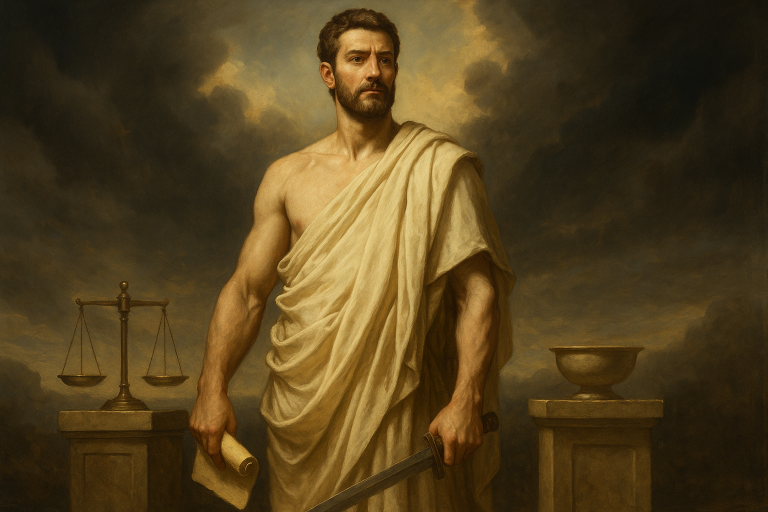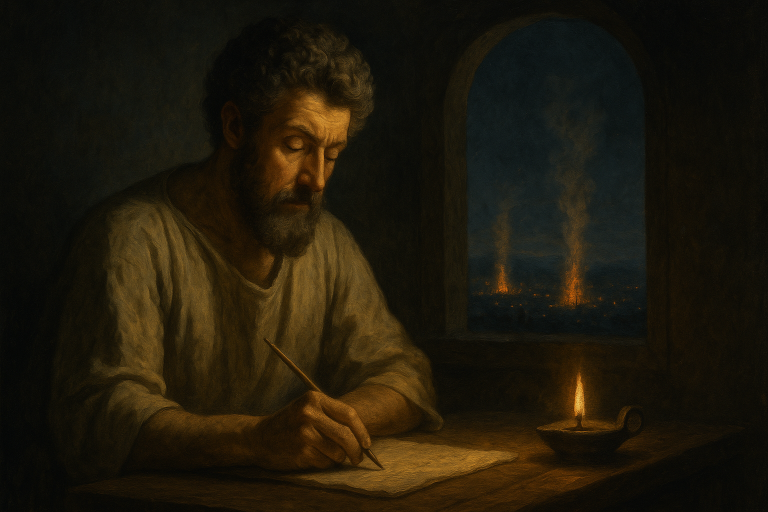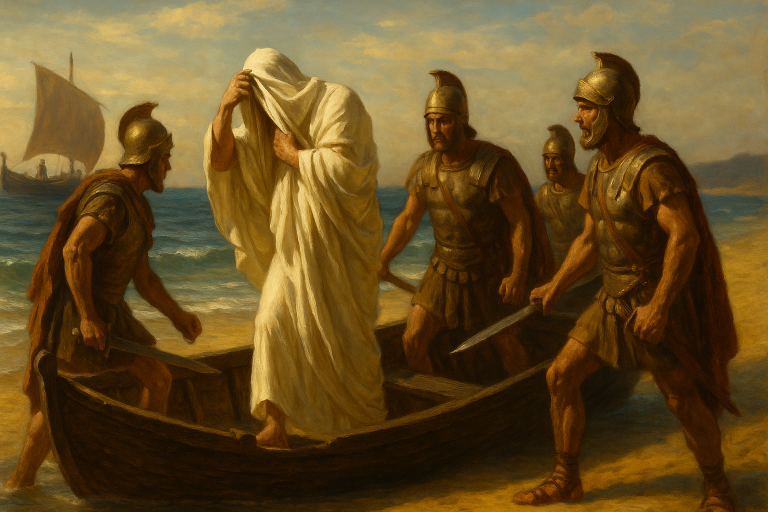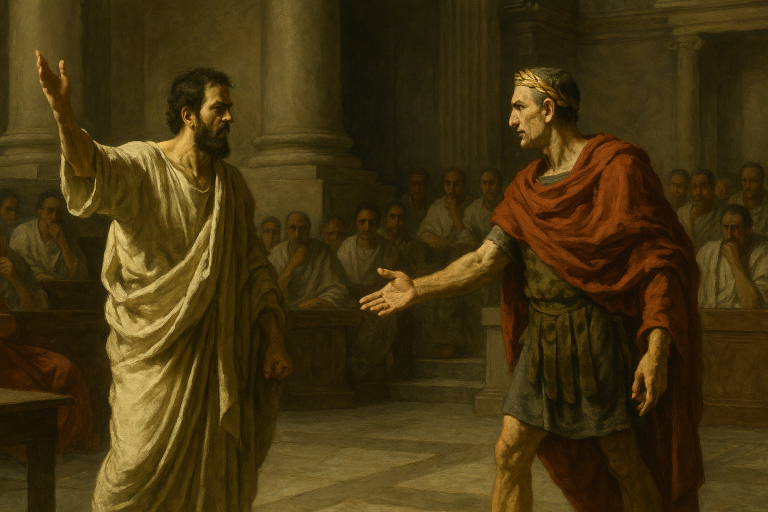The Catiline Conspiracy · When Cicero Saved Rome with Words and Blood
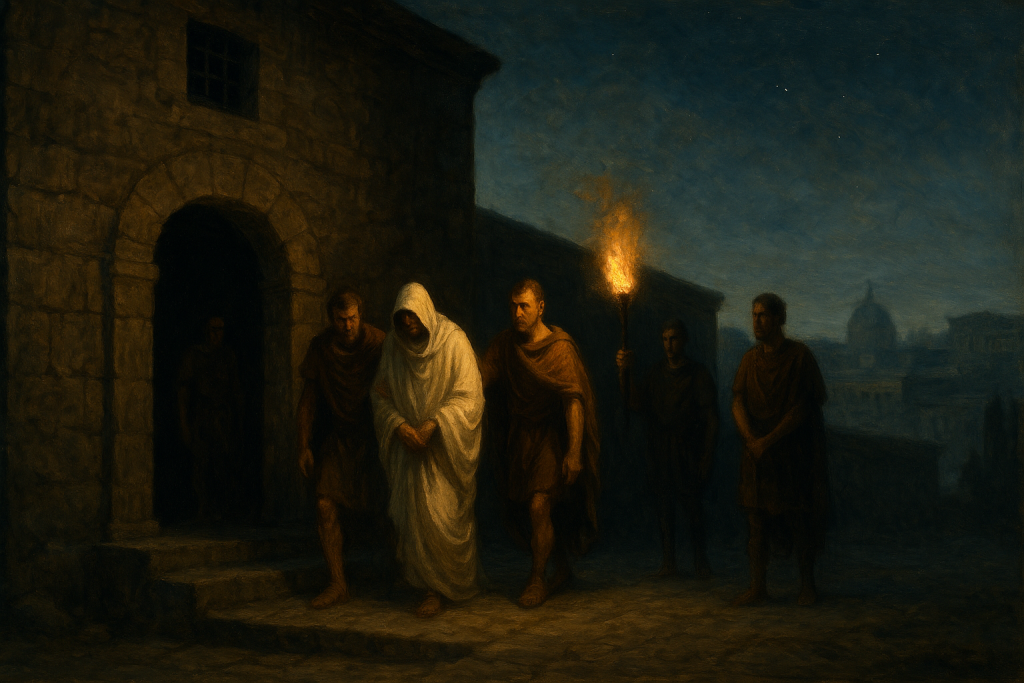
Rome, November 8, 63 BCE
The Senate gathered before dawn in the Temple of Jupiter Stater. Not their usual meeting place. The normal Senate house felt too exposed, too vulnerable. Armed guards stood at the doors. Senators arrived in groups, glancing over their shoulders, speaking in low voices. Everyone knew something was wrong. Rumors of assassination plots had spread through the city for weeks.
Then Lucius Sergius Catilina walked in.
He entered calmly, confidently, and took his seat among the senators as if nothing had changed. But everything had changed. As he sat, the senators nearest him stood and moved away. They left an empty circle around him, a visible ring of isolation. No one would sit beside a man accused of conspiracy against Rome.
Marcus Tullius Cicero, consul of Rome, entered the chamber. He saw Catiline sitting there, brazen and unafraid, surrounded by empty seats. Cicero had spent months investigating, gathering evidence, waiting for this moment. Now it had arrived.
He looked directly at Catiline and began to speak.
“Quo usque tandem abutere, Catilina, patientia nostra?”
How long, O Catiline, will you abuse our patience?
The Senate fell silent. What came next would determine whether Rome survived the year.
The Man Who Would Be King
Lucius Sergius Catilina had every advantage Rome could offer. He came from an ancient patrician family, one of the oldest noble houses in the city. He had served as a military officer during the Social War, earning a reputation for courage and competence. He had held magistracies, governed provinces, moved in the highest circles of Roman society. By birth and achievement, he should have been a natural leader of the republic.
But by 63 BCE, Catiline was finished. He had lost two consular elections, including the most recent one to Cicero, a man without noble ancestors, a self-made lawyer from the provinces. The humiliation burned. Worse, he was broke. Massive debts from lavish spending and failed political campaigns had left him desperate. His creditors circled. His political career was over. And Rome, in his view, had failed him.
He was not alone in that feeling. Debt crushed thousands of Romans. Veterans who had fought in Rome’s wars returned to find their land seized, their families dispossessed. Young nobles born to privilege discovered the family wealth exhausted. The gulf between the richest senators and everyone else had grown into a chasm. The republic’s machinery ground on, enriching a few and abandoning the rest.
Catiline saw opportunity in that desperation. He began holding secret meetings at his house. The attendees were a volatile mix: dispossessed nobles nursing grievances, debtors facing ruin, veterans without land, men who believed the system had cheated them and wanted to tear it down. Catiline promised them everything. Cancel all debts. Redistribute land. Seize power from the corrupt Senate. Use force if necessary.
The plan took shape through the summer of 63 BCE. Assassinate the consuls. Burn the city in strategic locations to create chaos. Seize control of the government while Rome burned. Install Catiline as leader and remake the republic according to their vision. It was not reform. It was revolution through arson and murder.
This was not fringe radicalism. Sitting senators attended the meetings. Men from prominent families committed to the plot. Catiline commanded real support, not just among the desperate but among some who should have been pillars of the state. Roman politics had already turned violent in living memory. Marius and Sulla had waged civil wars, proscribed enemies, filled the streets with bodies. Catiline was simply following the precedent. If force had worked before, why not now?
By October, the conspiracy was moving toward action. Catiline gathered troops in Etruria, north of Rome, under the pretense of a veteran settlement. Arms were stockpiled. A date was set for the coup. And in Rome, final preparations began for the assassination of the consul Marcus Tullius Cicero.
Cicero’s Intelligence Network
Cicero had no legions. He commanded no veterans loyal to him personally. He came from Arpinum, a town outside Rome, with no noble lineage to draw on. His entire career had been built on his voice, his intelligence, and his ability to navigate a system designed to exclude men like him. He was Rome’s consul because he had outmaneuvered better-born rivals through sheer brilliance. But brilliance would not stop a knife in the dark.
The warnings began quietly. Whispers in the Forum. Reports from clients and allies. Something was happening in Catiline’s circles, meetings that did not fit normal political activity. Cicero began investigating, carefully building a network of informants. He needed to know what was being planned before he could act.
His breakthrough came from an unexpected source. Fulvia was the mistress of Quintus Curius, a senator who had joined the conspiracy. Curius liked to talk, especially to impress women. He boasted to Fulvia about the coming changes, hinted at plots, dropped names. Fulvia realized what she was hearing and brought it to Cicero. Through her, Cicero gained a window into the conspiracy’s inner workings.
By late October, the intelligence was specific. The conspirators planned to kill Cicero at his home. The date: October 27, dawn. Two men would arrive claiming urgent business, gain entry, and murder him in his atrium. The coup would begin with the consul’s death.
Fulvia warned him the night before. On the morning of the 27th, when the assassins arrived and knocked, Cicero did not answer. Armed guards surrounded his house. The would-be killers saw the resistance and fled. The attempt had failed, but now Cicero knew for certain the conspiracy was real and immediate.
Still, knowing was not enough. He could not simply accuse Catiline without proof. Catiline had supporters in the Senate, powerful men who would demand evidence before moving against one of their own. Cicero continued his investigation, gathering testimony, building his case. He needed more than whispers. He needed something undeniable.
Through November, the pieces came together. More informants stepped forward. Letters were intercepted. The conspiracy grew bolder, which made it sloppier. By early November, Cicero had enough. He called a meeting of the Senate for November 8. And he made sure Catiline knew about it.
When Catiline walked into that Senate chamber on November 8, he walked into a trap that Cicero had spent months preparing.
The Orations
Cicero stood before the Senate and spoke the words that would echo through history. “How long, O Catiline, will you abuse our patience? How long will that madness of yours mock us? To what end will your unbridled audacity hurl itself?”
It was not a question. It was an indictment delivered in public, before witnesses, with the accused sitting ten feet away.
For the next hour, Cicero laid out the entire conspiracy. The secret meetings. The gathering of troops. The stockpiling of weapons. The assassination attempt against him. He named Catiline directly, repeatedly, stripping away any pretense of ignorance. The Senate knew. Rome knew. Everyone knew. And Catiline could no longer hide.
He spoke with precision, cataloging every detail he had gathered. But more than the facts, Cicero used psychological warfare. He isolated Catiline completely. By speaking the truth publicly, he made it impossible for Catiline’s allies to defend him without implicating themselves. By addressing Catiline directly, he forced a response. And when Catiline tried to shout back, the other senators would not let him speak. They physically moved away from him, leaving him alone in the center of the chamber, surrounded by empty space and hostile stares.
Cicero ended with a challenge. Leave Rome. Join your army. Face us openly if you dare. But stop pretending to be a senator when you are an enemy of the state.
That night, Catiline fled the city. He rode north to Etruria to join the forces he had gathered there. By fleeing, he confirmed everything Cicero had accused him of. The conspiracy was exposed, the leader gone, but the work was not finished.
The next day, November 9, Cicero addressed the Roman people in the Forum. He explained what had happened in the Senate. He laid out the conspiracy for the citizens, making sure they understood the danger Rome had faced and how close it had come. He built public support for what would come next, because the conspirators still in Rome were not finished.
Through late November, the remaining plotters continued their work. They approached the Allobroges, a Gallic tribe with a delegation in Rome, seeking their support. They needed outside forces to help overthrow the government. But the Allobroges, who owed favors to Rome and did not trust desperate men promising revolution, reported the approach to Cicero.
Cicero saw his chance. He told the Allobroges to pretend to cooperate. Get the conspirators to write down their plans. Obtain physical evidence. The Allobroges did exactly that. The conspirators, eager for support, wrote letters detailing their plans and sealed them with their personal signets.
On December 2, as the Allobroges left Rome to return home, Cicero’s men intercepted them at the Mulvian Bridge. They seized the letters. The seals were intact. The evidence was undeniable.
On December 3, Cicero delivered his third speech before the Senate and the assembled people of Rome. He presented the captured letters. He broke the seals in front of everyone. The handwriting matched. The signets matched. The conspirators present in the crowd could not deny their own words. Five were arrested on the spot, including Lentulus, a sitting praetor. The Senate declared them enemies of the state. The conspiracy was broken.
Two days later, on December 5, the Senate debated what to do with the captured conspirators. Julius Caesar, already a rising political force, argued for life imprisonment. It was politically shrewd, avoiding the controversy of execution while still removing the threat. But Cato the Younger stood and argued for death. The republic was in danger. These men had waged war against Rome from within. They deserved no mercy.
Cicero supported execution. He made the case that the republic’s survival required it. The Senate voted. Death carried the day.
That night, the five conspirators were led down into the Tullianum, the ancient dungeon beneath the Capitoline Hill. One by one, they descended into the darkness. One by one, they were strangled. When the last was dead, Cicero emerged and announced to the waiting crowd with a single word: “Vixerunt.” They have lived. The euphemism was understood. The conspirators were dead.
The conspiracy was crushed. Rome was saved. But the cost was still being calculated.
The Executions
The Tullianum was Rome’s oldest prison, a stone chamber carved beneath the Temple of Saturn on the Capitoline Hill. Prisoners descended through a hole in the ceiling into complete darkness. Cold, damp, airless, it was where enemies of Rome went to die. The conspirators were taken there in the evening, under guard, with no ceremony.
Roman citizens had rights that even slaves did not. The right to trial. The right to appeal to the people. The provocatio, the ancient guarantee that no citizen could be executed without the chance to plead their case before the assembled citizens of Rome. These were foundational principles, protections that separated Rome from tyranny.
Cicero suspended them all. He argued that the conspirators were not citizens in the moment of their execution but enemies waging war. The Senate had declared them public enemies. Emergency powers justified emergency measures. The republic was in danger, and normal procedures could not be followed when survival was at stake.
It was legally questionable. It was politically brilliant. And it was morally complex in ways that would haunt Cicero for the rest of his life.
In the immediate aftermath, Rome celebrated. Crowds cheered Cicero as he walked home from the executions. The Senate praised him, calling him the savior of the republic. He was given the title Pater Patriae, Father of the Fatherland, an honor reserved for Rome’s greatest men. For weeks, he basked in the glory of having stopped the conspiracy through intelligence and oratory. The lawyer had saved Rome not with swords but with speeches.
But Catiline was still alive, still leading an army in Etruria. Through December and into January, Roman legions marched north to confront him. At Pistoria, in early 62 BCE, they cornered his forces. Catiline refused surrender. He ordered his men to charge directly into the Roman lines, knowing it meant death. He died fighting, surrounded by the bodies of his enemies, his army annihilated around him. The conspiracy died with him.
Yet even in victory, the problems Cicero’s actions created were becoming visible. Julius Caesar, who had argued against execution, remembered. Publius Clodius, a populist tribune, remembered. They noted that Cicero, for all his talk of law and republican virtue, had ordered Roman citizens killed without trial. Years later, in 58 BCE, Clodius used that fact to drive Cicero into exile. The very act that had saved Rome became the weapon used to destroy its author.
The precedent was set. A consul, facing emergency, could suspend legal protections and execute citizens. It was justified by necessity. It was effective. And it was exactly the kind of logic Julius Caesar would use when he marched on Rome decades later. Emergency powers, claimed in the name of saving the republic, became the tools for dismantling it.
Rome was saved in 63 BCE. But the method of its salvation contained the seeds of its destruction.
Why It Mattered
The Catiline conspiracy was not an aberration. It was a symptom. Rome’s political system by the first century BCE produced desperate men with nothing to lose and no faith in legal solutions. Debt crushed families. Veterans returned from campaigns to find their land seized. The gap between the wealthiest senators and everyone else had become unbridgeable. Catiline exploited that desperation, but he did not create it.
The conspiracy nearly succeeded not because Catiline was uniquely brilliant but because the republic was uniquely vulnerable. Sitting senators joined the plot. Prominent families supported it. The machinery of government, which should have detected and stopped such a threat early, was too corrupted and paralyzed to act until Cicero forced it to.
Cicero saved Rome with speeches. That matters. In a city where political violence had become normalized, where Marius and Sulla had settled disputes with proscription lists and street battles, Cicero proved that oratory could still work. He exposed the conspiracy through words, isolated Catiline through rhetoric, and rallied the Senate through persuasion. For a brief moment, it seemed the republic could survive on the strength of its ideals rather than the force of its swords.
But that moment did not last. The conspiracy required executions to finish it. Words exposed the plot, but violence ended it. Cicero, the lawyer who built his career on eloquence and law, had to order men strangled in the dark. The republic could not be saved cleanly. It required getting hands dirty, breaking its own rules, justifying necessary evil in the name of survival.
That tension defines the conspiracy’s legacy. Cicero was right that the plot had to be stopped. He was wrong to think he could stop it without consequences. The executions saved Rome but set a precedent that would destroy it. Future leaders would claim the same emergency powers, the same necessity, the same justification. And each time, the republic’s legal protections would erode a little more.
Cicero represented something important: the new man, without noble blood or military glory, rising through merit and intelligence. His victory over Catiline proved that talent could still triumph in Rome, that the republic’s ideals were not completely dead. But his methods proved something else. Even the new man, even the lawyer, even the defender of republican virtue, had to break the law to preserve it. And once broken, the law never quite regained its authority.
The question the conspiracy poses is uncomfortable. When your republic is burning, do you follow every rule? Or do you break them to save what they protect? Cicero chose the latter. Rome survived 63 BCE because of that choice. But within a generation, the republic fell to men who made the same calculation for worse reasons.
There is no clean answer. Letting Catiline succeed was unthinkable. But stopping him required compromising the principles that made the republic worth saving. The conspirators were guilty. The executions were justified by the immediate threat. But the precedent was dangerous, and the danger proved real.
Rome was saved, but at a cost that would be paid for decades.
The Weight of Words
November 8, 63 BCE. The Senate chamber in the Temple of Jupiter Stater. Cicero standing before his colleagues, Catiline sitting in an empty circle of isolation, guards at the doors.
“How long will you abuse our patience?”
For one moment, that was enough. The exposure, the naming, the public indictment stripped away Catiline’s pretense and forced him to flee. Words, not swords. Oratory, not violence. The power of truth spoken publicly, before witnesses, in a republic that still believed truth mattered.
But that night, Catiline rode out of Rome toward his army. Two months later, five men died in darkness beneath the Capitol. And two months after that, Catiline charged to his death in battle. Words started it, but violence finished it. The pattern repeated, each cycle eroding a little more of what the republic claimed to protect.
The question Cicero faced was the question every republic faces: What do you do when following the rules might cost everything? When the law you swore to uphold prevents you from saving the system the law was meant to protect?
Cicero answered by breaking the law to save Rome. He was right. He was wrong. He was necessary. He was dangerous. All of these at once, and the contradiction never resolves.
Rome survived 63 BCE because one man was smart enough, brave enough, and ruthless enough to do what the moment required. But the methods he used became the template for the republic’s destruction. The emergency powers he claimed, others would claim. The precedent he set, others would follow. The law he broke, others would shatter.
In the end, Rome was saved. But the act of saving it revealed how fragile the republic had become, how close to collapse, how dependent on individual will rather than institutional strength. Cicero proved a brilliant man could save Rome through intelligence and rhetoric. He also proved that even the most brilliant defender of the republic had to compromise its principles to preserve it.
The words remain, though. “How long, O Catiline, will you abuse our patience?” They still carry power, the power of exposure, of naming corruption publicly, of refusing to pretend the threat is not real. That power saved Rome once. Whether it was worth the cost is a question each generation answers for itself.


